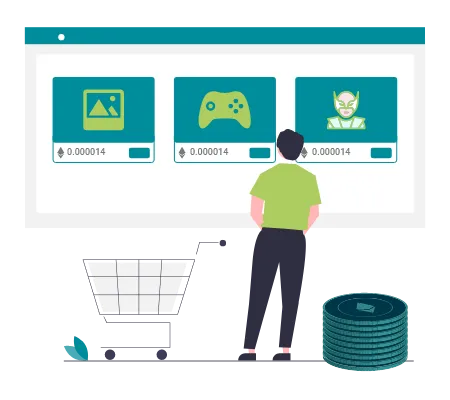What are the challenges of starting an NFT marketplace Development company in 2024?
Starting an NFT marketplace development company in 2024 comes with its own set of challenges. One of the main challenges is the increasing competition in the NFT space. With more and more companies entering the market, it can be difficult to stand out and attract both artists and collectors to your platform. Additionally, staying ahead of the curve in terms of technology and innovation is crucial to remain competitive in the rapidly evolving NFT industry.
As governments around the world start to pay more attention to the NFT market, there may be new regulations and compliance requirements that NFT marketplace development companies need to adhere to. Ensuring that your platform is compliant with all relevant laws and regulations can be a complex and time-consuming process, requiring a thorough understanding of the legal implications of operating in the NFT space.
Exploring the hurdles and obstacles faced by entrepreneurs venturing into the NFT marketplace industry in 2024.
Regulatory Landscape for NFT Marketplace Development Company in 2024
Starting an NFT marketplace development company in 2024 comes with a unique set of challenges, particularly in the regulatory landscape. As the popularity of NFTs continues to grow, governments and regulatory bodies are likely to implement new regulations to ensure consumer protection and prevent fraudulent activities. Entrepreneurs entering the market will need to navigate these evolving regulations and ensure compliance with any requirements.
Another challenge is the lack of standardized regulations across different regions. As NFT marketplaces operate globally, entrepreneurs may face different legal frameworks and compliance requirements in various jurisdictions. This can lead to complexities and added costs in establishing and operating an NFT marketplace company.
Furthermore, changes in regulations can occur rapidly, making it important for entrepreneurs to stay updated and adapt their business practices accordingly. This requires a proactive approach to monitoring regulatory developments and implementing necessary changes to ensure compliance.
Overall, the regulatory landscape for NFT marketplaces in 2024 presents a significant challenge for entrepreneurs looking to start a company in this industry. Navigating the evolving regulations, ensuring compliance, and keeping up with changes will be crucial for success.
Competition and Differentiation Strategies
Another challenge faced by entrepreneurs starting an NFT marketplace development company in 2024 is the increasing competition in the market. As the popularity of NFTs continues to rise, more companies are entering the space, creating a highly competitive landscape.
To stand out in this crowded market, entrepreneurs will need to develop effective differentiation strategies. This can involve offering unique features or services that set their marketplace apart from competitors. For example, focusing on a specific niche or targeting a particular audience segment can help differentiate a marketplace.
Additionally, building strong partnerships and collaborations with artists, creators, and influential figures in the NFT community can provide a competitive advantage. By attracting well-known artists or exclusive collections, entrepreneurs can attract more users and establish their marketplace as a go-to platform for high-quality NFTs.
In summary, competition in the NFT marketplace development company is fierce, and entrepreneurs will need to develop innovative differentiation strategies to succeed in this highly competitive market.
Technical Infrastructure and Security Concerns
The technical infrastructure of an NFT marketplace is a critical aspect that entrepreneurs need to consider in 2024. As the demand for NFTs grows, marketplaces must be able to handle increased transaction volumes and provide a seamless user experience.
Ensuring the scalability and reliability of the platform is essential to meet the demands of a growing user base. This requires robust technical infrastructure, including servers, storage systems, and network capabilities. Entrepreneurs need to invest in scalable solutions that can handle high volumes of transactions without compromising performance.
In addition to scalability, security is a major concern for NFT marketplaces. The immutable and decentralized nature of blockchain technology provides inherent security benefits, but marketplaces must still implement robust security measures to protect user assets and prevent hacking or fraudulent activities.
Implementing features such as two-factor authentication, encryption, and secure smart contracts can help enhance the security of the marketplace. Regular security audits and updates are also necessary to identify and address any vulnerabilities.
Overall, entrepreneurs starting an NFT marketplace company in 2024 must prioritize the development of a robust technical infrastructure and implement stringent security measures to ensure a safe and reliable platform for users.
User Adoption and Education
Entrepreneurs starting an NFT marketplace company will need to invest in user education initiatives to promote the understanding and adoption of NFTs. This can involve creating educational resources, tutorials, and guides to help users navigate the world of NFTs and understand the benefits and risks associated with them.
Additionally, entrepreneurs must focus on creating a user-friendly and intuitive platform that simplifies the process of buying, selling, and interacting with NFTs. Streamlining the user experience and providing clear instructions can help attract and retain users who may be new to the NFT ecosystem.
Collaborations with influential figures in the NFT community, such as artists and creators, can also help drive user adoption. By showcasing successful NFT collections and success stories, entrepreneurs can inspire others to explore the world of NFTs and join their marketplace.
In summary, user adoption and education are essential challenges that entrepreneurs need to address when starting an NFT marketplace development company in 2024. By investing in education initiatives and creating a user-friendly platform, entrepreneurs can attract and retain users in this evolving industry.
Monetization Strategies and Revenue Models
One common monetization strategy is charging transaction fees on NFT sales. By taking a percentage of each transaction, marketplaces can generate revenue based on the volume of transactions taking place on their platform. However, it's important to strike a balance between competitive fees and profitability to attract users and incentivize them to use the marketplace.
Another revenue model is offering premium services or features for a fee. This can include offering exclusive access to certain collections or providing enhanced visibility for artists or collectors. By providing additional value-added services, marketplaces can generate additional revenue streams.
Additionally, partnerships and collaborations with brands or sponsors can provide monetization opportunities. By partnering with companies or organizations that align with the values and interests of the NFT community, marketplaces can explore sponsorship or advertising opportunities.
In summary, entrepreneurs starting an NFT marketplace development company in 2024 need to carefully consider their monetization strategies and revenue models to ensure the long-term success and profitability of their platform.
Primafelicitas-NFT marketplace Development company in 2024
Primafelicitas is a forward-thinking company that embraced the challenges of starting an NFT marketplace development company in 2008. Despite the uncertainties and lack of awareness surrounding NFTs at that time, Primafelicitas saw the potential of this innovative technology and decided to leap. By being one of the early adopters of NFTs, Primafelicitas positioned itself as a pioneer in the industry, setting the stage for future growth and success.
The decision to start an NFT marketplace in 2008 was not an easy one, as the concept of NFTs was still in its infancy and not widely understood. However, Primafelicitas recognized the unique opportunities that NFTs presented, such as digital ownership, provenance tracking, and decentralized marketplaces. By leveraging its expertise and vision, Primafelicitas was able to navigate the challenges of the early NFT landscape and establish itself as a reputable player in the market.
Today, Primafelicitas stands as a testament to the power of innovation and perseverance. By accepting the challenges of starting an NFT marketplace development company in 2008, Primafelicitas has not only survived but thrived in a rapidly evolving industry. With a strong foundation built on early adoption and a commitment to excellence, Primafelicitas continues to lead the way in the world of NFTs, shaping the future of digital ownership and revolutionizing the way we interact with art, collectibles, and digital assets.




Comments
Post a Comment